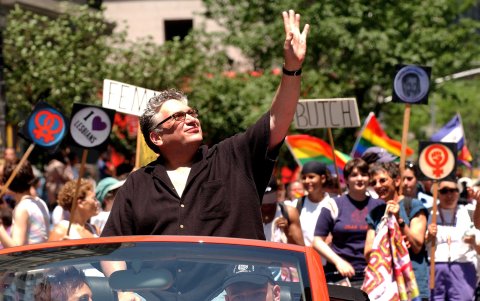
If there were a Forrest Gump of modern gay history, it would have to be Tony-Award-winning actor and writer Harvey Fierstein. From taking to the streets in the days following the Stonewall riots in 1969 when he was just 15 years old to the gay rights movement of the 1970s to his rise to fame as one of the most prominent (if not the most prominent) out gay voice on Broadway and in Hollywood at the height of the AIDS epidemic of the 1980s, Fierstein has been there for it all.
"Are you aware when you're living your life, what the perspective is? Of course not," Fierstein tells Newsweek, reflecting on how his own experience as a young man didn't exactly jibe with the mainstream media idea that all queer people had to be either sad or scary. "I knew something was going on. I knew that my idea of who I was and who the gay people I was meeting didn't match up with what I was being told it was supposed to be," he says. Fierstein reflects on this positive unique queer perspective and more in his new memoir I Was Better Last Night (Penguin Random House). When reading the book, one can't help but hear Fierstein's singular, gravelly voice.
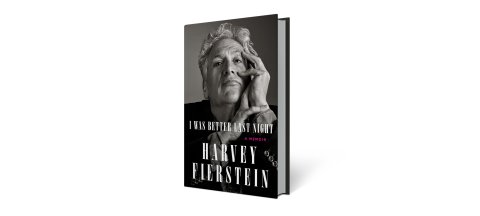
He says he wrote a memoir not to document his part in modern gay history, but because he had time on his hands. "The pandemic hit. I cleared my desk of all the work that I had to do," he recalls, "My agent said to me, 'Why don't you write your memoir?' I said no, don't be silly.''
Fierstein says he didn't know how to go about it. "So I asked Shirley MacLaine, who has written like 20 memoirs. She said, trust your memory, memory will be the thing that edits it."
And memory serves Fierstein well. Born June 6, 1954, in the Bensonhurst neighborhood of Brooklyn, Fierstein grew up in the theater, going to shows with his mother, father and brother. He says, "Showbiz bios open with, 'One day, that's gonna be me on that stage.' Well, I was the opposite. I went to the theater and I never thought, 'I want to be up there.'"
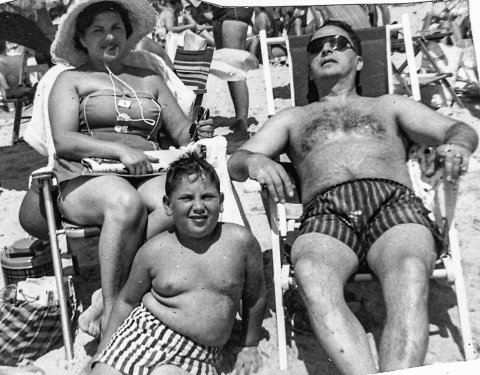
Instead, Fierstein focused on art, attending Manhattan's High School of Art and Design and earning a BFA from Pratt Institute, all the while dabbling in community theater (mostly backstage). But it was art that led him to his first major role in Andy Warhol's play Pork.
"There was an ad in the paper for Andy Warhol doing a play and he was having auditions. I said, 'There is no way I'm ever going to get to meet Andy Warhol. But if I audition for his play, he could be there.' So my friend took a photograph of me and printed up that 8 by 10. I typed up a resume, Xeroxed it in the library, stapled it together and down I went to something called La MaMa [New York's legendary Off-Off Broadway theater]. I walked into this room with these very singular people. They said, 'What have you got?' I did Juliet from the balcony scene of Romeo and Juliet.... They're all screaming laughing. And so all of a sudden, I was in this play."
That experience would lead Fierstein to the epicenter of the experimental theater movement, and to writing the play that would catapult him to stardom: Torch Song Trilogy.
The premise of Torch Song Trilogy is very conventional: a person in search of love and meaning. However, it was very bold for 1978 when the show premiered at La MaMa, because the person in search of love and meaning was a Jewish gay man who earns his living as a drag queen. "When I wrote Torch Song Trilogy, you could still be arrested just for holding hands on the street. Cops still broke into bars," Fierstein says.
The show would straddle two very different realities for queer Americans. On one hand, it represented a pre-AIDS era, eventually moving to Broadway and winning the 1982 Tony Award for Best Play and Best Actor in a Play for Fierstein. But while all of this was happening, the AIDS epidemic and the backlash against queer people that came with it were lurking in the shadows. Their impact were soon felt by every part of the queer community.
In 1988, Fierstein adapted the play's script into a film directed by Paul Bogart and starring Fierstein, Matthew Broderick and Anne Bancroft. Fierstein says, "The movie was at the real height of AIDS panic."
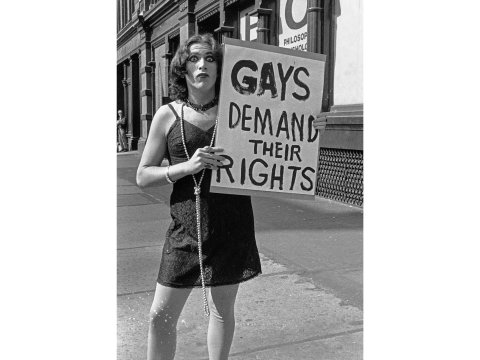
"I tell the story [in the book] of that cartoon that I saw....There was three movies showing at a triplex: Tequila Sunrise, Torch Song Trilogy and Twins. This straight couple walks by [the gay couples waiting to see Torch Song Trilogy] and the guy says, 'I'm not standing in that line with those gay people.'"
In recent years, though, Fierstein says, he has noticed a heartening change in both the composition and the attitude of audiences coming to see new stage productions of the play.
"When they did the revival [on Broadway in 2019], the difference between the audience back in the '70s and the audience now is really remarkable," he says. "Originally you had a straight audience with gay people sprinkled in there, and they were trying to hide, they were very quiet, they would not talk loud, laugh. Now the audience came in to party. They were there with all their gay friends. And they owned it. This was part of their history. This was something they earned. This is something they owned and appreciated. So whereas you had this fear, now all these years later—though it's a lifetime, it's not that long—how did that happen? A lot of hard work, but also the dreaming of young people."
In telling his own story, Fierstein describes how time passes and people evolve. The big lesson for him, he says, was learning that maybe the most important thing any of us can do is listen to the next generation.
"I don't remember what year it was," he recalls, "but I noticed this [marriage equality] group in front of us as we're gathering for the Gay Day parade. What's with this marriage equality crap? They're all standing there performing a marriage. We have things to really fight for here, we don't got time to get a white dress and flowers. We've got 'Don't ask, don't tell,' we're still banned from giving blood to the Red Cross. We have a lot of stuff and they're busy worrying about marriage?"
"And then I said to myself, 'You know what? Shut the f*ck up.' They're the young people. They've chosen this as their issue. The best thing you can do is shut up and listen and back them up. Well, guess what? They turned out to be right. Because heterosexuals couldn't maybe understand gays in the military, but they did understand wanting to be married. They did understand tax law and wanting to have children and wanting monogamy. Finally, they had something they can relate to."
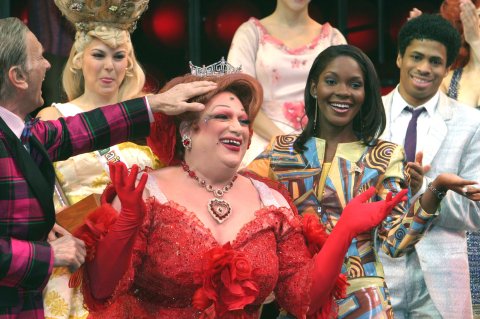
After the success of Torch Song Trilogy on stage Fierstein was busy in theater, film and TV, but quietly struggled with an addiction to alcohol. "I knew I was dying. I was physically dying. I describe it in the book that I hadn't had a solid bowel movement in months. My legs were killing me from developing gout. I never had a hangover, because I was never sober."
He continues, "Coming out of that death place where I had said, 'Okay, doing what I wanted to do led me to a very dark, horrible place. I am now giving up my will for the moment.' Because you could only do it one day at a time and see where that takes me. And then it took me to unbelievable places."
Sobriety took Fierstein back to Broadway for his Tony-winning role as Edna Turnblad in Hairspray. The performance fueled a career revival, with near-constant work since the musical debuted in 2002. Just this year, he's completed work on the script for Broadway's Funny Girl revival and is working on an original musical with composer Alan Menken.
Talking with Fierstein about his life and career, one thing becomes clear: He's a champion of being your authentic self no matter what others say you should be.
"This idea that I was taught as a child, brotherhood and all that crap, that we're all the same and we should all appreciate each other because we're all the same. I have lived a long time and I've got to say, not one of us is the same," he says. "Every one of us is different. And I started realizing we're all different, appreciate our differences. Tell me about you. I'll tell you about me. I will respect you. You respect me. Let's stop making believe we're all the same."
→ Listen to the full conversation with Harvey Fierstein on Newsweek's The Parting Shot podcast.
About the writer
A writer/comedian based in Los Angeles. Host of the weekly podcast Parting Shot with H. Alan Scott, ... Read more













